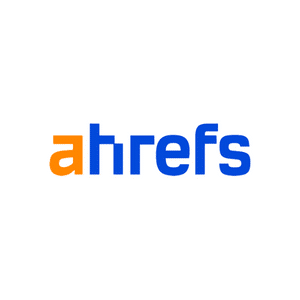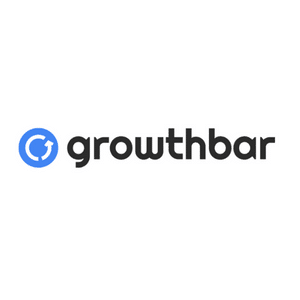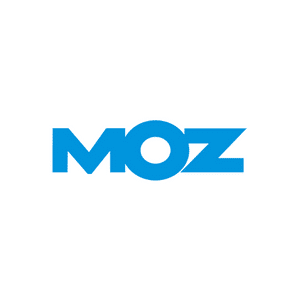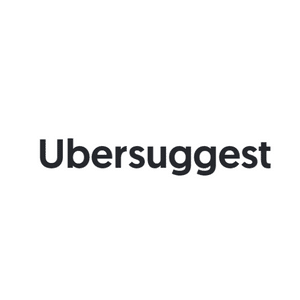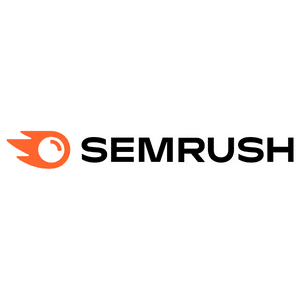If you want to have an understanding of where you’re going, you have to have a sense of where you’re at! That’s why you need to start tracking your SEO keywords with a keyword tracking tool.
In this article, I’ve personally reviewed and ranked the best keyword rank tracking tools of 2023!
Why should you care? Because I’ve personally used these companies (and I ran a multi-million dollar SEO agency while I did it).
The Best Keyword Tracking Tools In the Whole World
Let’s go over the 16 best keyword tracking tools of 2023, so you can decide which is best for you!
Ahrefs
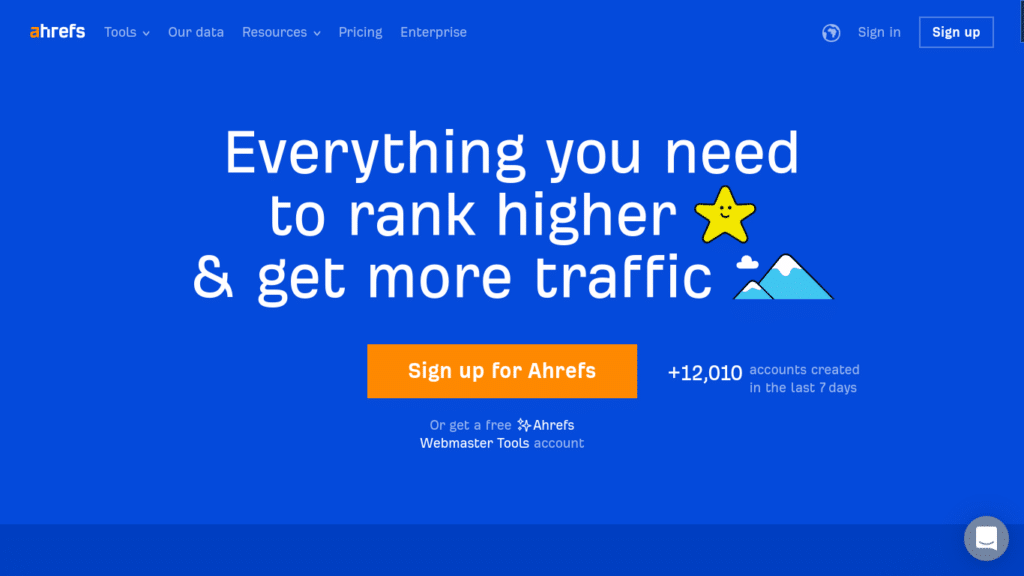
Ahrefs is one of the market’s most comprehensive and reliable keyword-tracking tools.
Not only can you track your rankings, but they also provide tons of helpful information on your competitors, such as backlinks, top pages, search volume trends, and more.
Plus, their customer service is always quick to respond to concerns or questions.
Key Features:
- Tracks rankings for up to 10,000 keywords at a time
- Provides detailed competitor analysis reports
- Has SEO audit tools to help improve your site’s search performance
Pricing Plans
Ahrefs has four different pricing options depending on your needs. They also offer 2 free months when you buy an annual subscription.
Lite
- $99/month
- 750 ranked keywords
- Great for small businesses
Standard
- $199/month
- 2,000 ranked keywords
- Perfect for SEO professionals
Advanced
- $399/month
- 5,000 ranked keywords
- Ideal for expanding businesses
Enterprise
- $999/month
- 10,000 ranked keywords
- Great for more prominent companies and enterprises
Pros
- Comprehensive information on competitors' backlinks and search trends
- Lots of great tools to help with keyword tracking
- Frequently updated keyword rankings
- Great value for your money, especially with the annual pricing plans
Cons
- The interface can be confusing for new users
- No free trial
Semrush
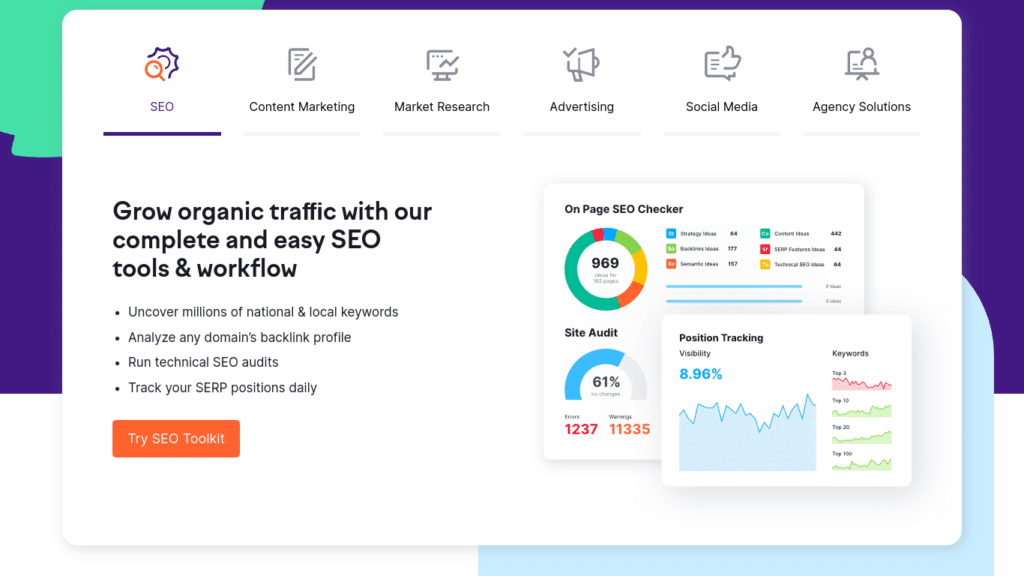
Semrush is a fantastic rank tracking tool. It’s great for keeping track of your website’s ranking as well as your competitors’.
It’s easy to use and can help you come up with new keywords to target. If you’re looking for a powerful keyword rank tracker, Semrush is worth checking out.
Plus, they offer a free trial period on their Pro and Guru plans so that you can try out their services risk-free before committing.
Key Features:
- Daily keyword tracking
- Useful analytics for keywords, domains, and backlinks
- Competitor analysis tools such as a social media tracker
Pricing Plans
Semrush has 3 different pricing plans ranging from programs for small teams all the way to large enterprises. The plans are Pro, Guru, and Business.
Pro
- $119.95/month
- 5 projects
- 500 keywords to track
- 10,000 results/report
Guru
- $229.95/month
- 15 projects
- 1,500 keywords to track
- 30,000 results/report
Business
- $449.95
- 40 projects
- 5,000 keywords to track
- 50,000 results/report
Pros
- User-friendly and accessible for beginners
- Daily updates on keyword tracking
- Great for enterprises because it offers a ton of features
Cons
- Pricey compared to other SEO rank tracking
Authority Labs
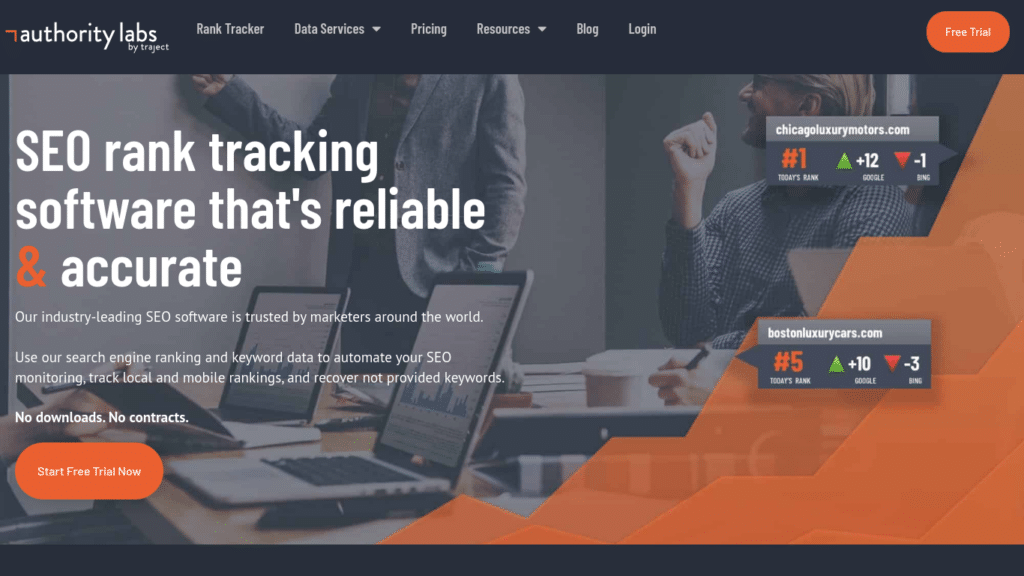
Authority Labs is one of the leading SEO rank tracking tools on the market. It offers a comprehensive and user-friendly platform that makes it easy to track the performance of your website and keywords.
The tool also provides detailed reports and graphs that help you understand your website’s search engine visibility and traffic trends.
Key Features:
- Historical tracking
- Competitor analysis
- Local SEO tracking
Pricing Plans
Authority Labs has 4 pricing plans. They are Plus, Pro, Pro Plus, and Enterprise. All 4 have mobile rank tracking, daily updates and allow unlimited users.
Plus
- $49/month
- 250 keywords
- 50 domains
Pro
- $99/month
- 1,000 keywords
- 100 domains
- White label SEO
Pro Plus
- $225/month
- 2,500 keywords
- 500 domains
- White label SEO
Enterprise
- $450/month
- 5,000+ keywords
- Unlimited domains
- White label SEO
- Interface API access
Pros
- Offers a free trial
- Easy to use for beginners
- Daily updates
- White-label SEO for Pro, Pro Plus, and Enterprise packages
Cons
- We had a couple of issues with specific keywords not tracking correctly
GrowthBar
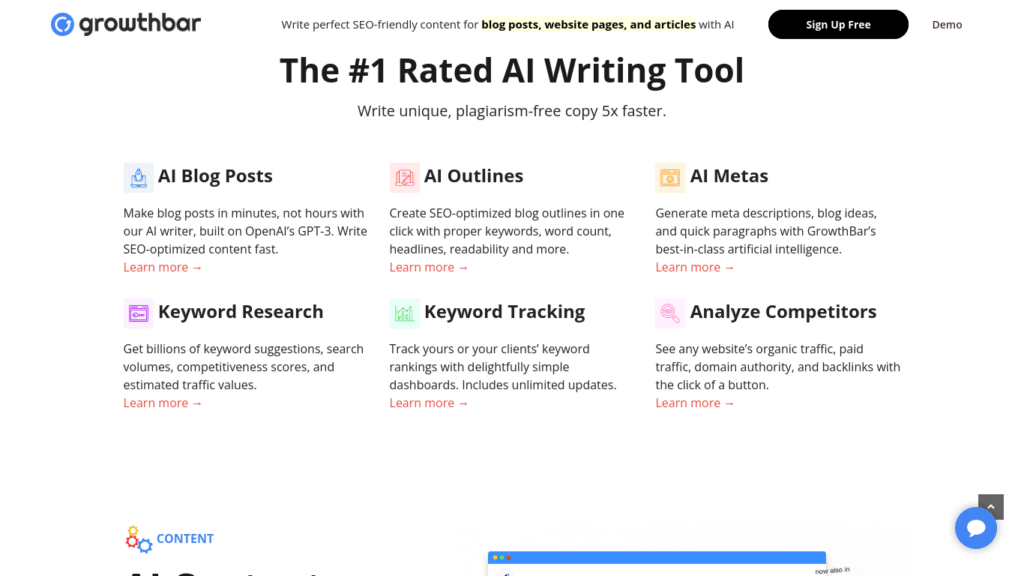
Growthbar is an excellent tool for tracking your website’s growth and understanding your audience.
With its easy-to-use interface, you can see where your website is growing the most and who your audience is.
This information can help you better understand what content resonates with your audience and improve your website’s growth.
Key Features:
- Detailed tracking of your website’s search rankings
- AI content generator
- Analysis of your website’s search engine traffic
- Reporting on your website’s overall SEO health
- Comprehensive keyword research tools
Pricing Plans
GrowthBar is an affordable keyword rank tracker and is one of the best on the market in terms of SEO metrics. Their pricing plans are designed to fit any business size and budget.
They have 3 pricing plans. All 3 offer unlimited AI blog ideas and AI meta descriptions.
Standard
- $48 per month
- 25 AI content outlines
- Tracks 25 keywords across 1 website
Pro
- $99 per month
- 100 AI content outlines
- Tracks 1,000 keywords across 3 websites
Agency
- 199 per month
- 300 AI content outlines
- Tracks 5,000 keywords across 25 websites
Pros
- Great content generator
- Offers a 5-day free trial to try it out
Cons
- Growthbar has fewer features than some of the other advanced web ranking tools on the market. This can be a disadvantage for users who need more detailed information about their keywords
STAT
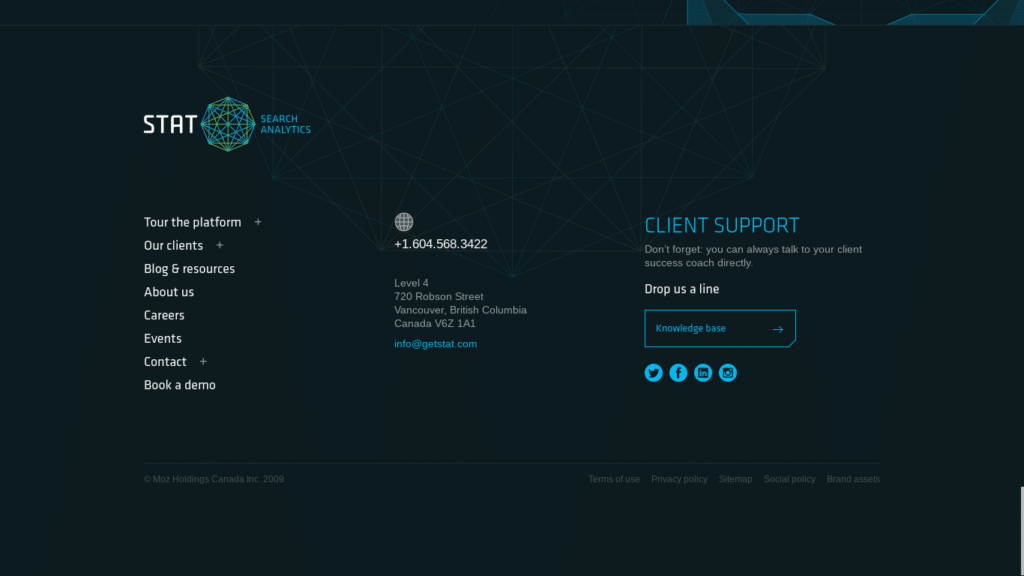
Stat is a great keyword-tracking tool because it’s always up-to-date with the latest changes in search engine algorithms, such as google search results.
It also has many features that allow you to track your keywords in great detail. Plus, customer support is top-notch, so you can always get help if you need it.
Key Features:
- Daily keyword tracking
- Competitor rank tracking tool
- Keyword suggestions
Pricing Plans
- Stat is priced for scale, meaning you only pay for the keywords you track. Tracking starts at $720/month.
Pros
- Pricing by scale
- Tons of keywords are tracked daily
Cons
- Some users might prefer a lower price per month membership program.
Ubersuggest
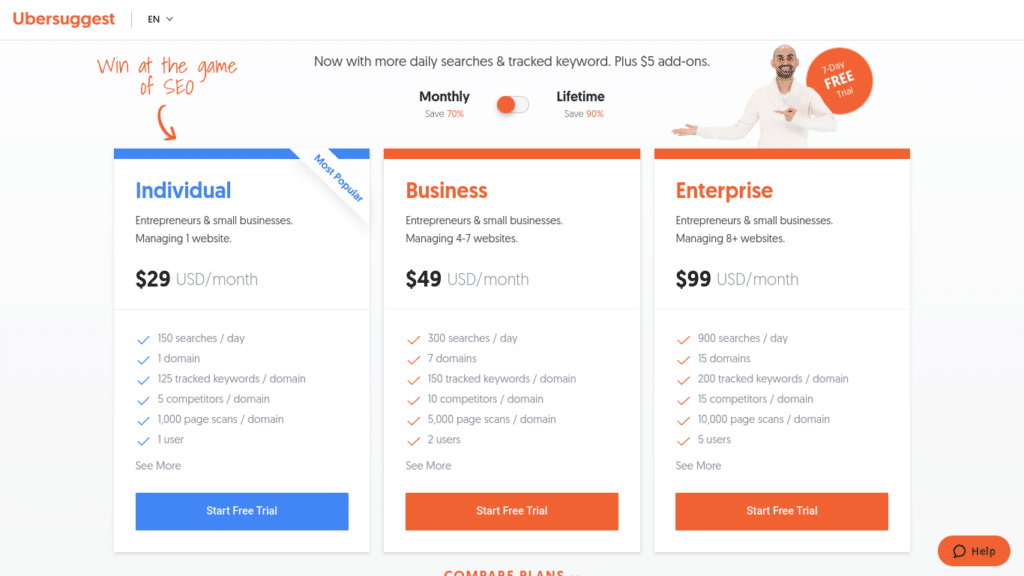
Whether you’re looking to optimize your website for SEO or improve your content marketing efforts, Ubersuggest is an invaluable resource that can be a powerful and easy-to-use platform.
You can quickly understand what keywords drive the most traffic to your website and how you can improve your performance.
With its powerful features and comprehensive keyword tracking capabilities, Ubersuggest is a must-have tool for anyone looking to take their website’s SEO to the next level.
Key Features
- In-depth keyword research capabilities
- Easy-to-use interface
- Generates keyword suggestions based on your search query
Pricing Plans
Ubersuggest has 3 pricing plans available. They are Individual, Business, and Enterprise/Agency
Individual
- $29/month
- 150 searches/day
- 1 domain
- 125 keywords/domain
- 1 user
Business
- $49/month
- 300 searches/day
- 7 domains
- 150 keywords /domain
- 2 users
Enterprise/Agency
- $99/month
- 900 searches/day
- 15 domains
- 200 keywords/domain
- 5 users
Pros
- Very affordable pricing
- Free trials on all 3 plans
Cons
- Lacks some features that other keyword-tracking tools offer
Labrika
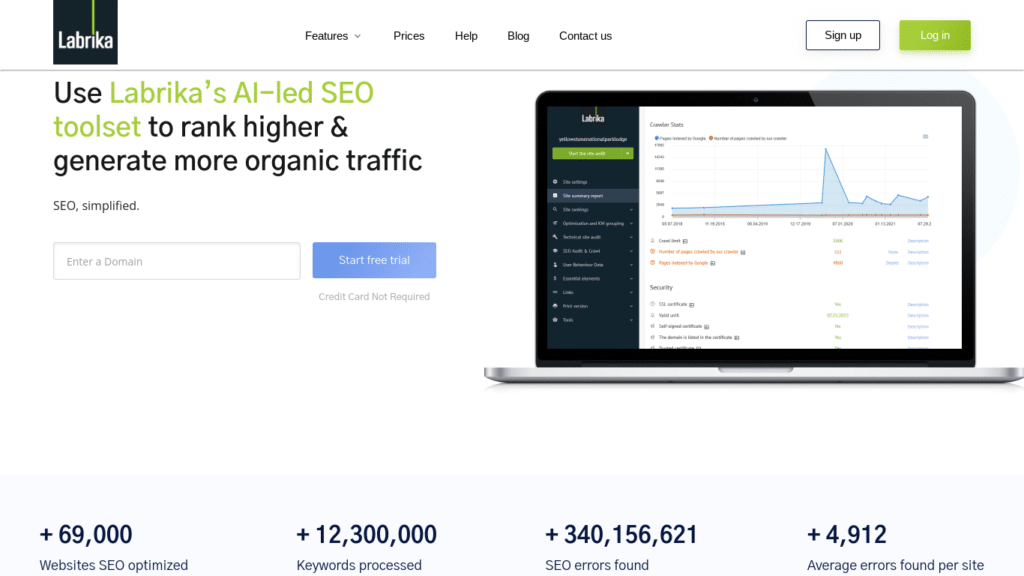
Labrika is one of the best keyword-tracking tools on the market. It’s easy to use and provides comprehensive data on the search engine results pages (SERP) for any given keyword.
In addition to showing you the ranking of your website for a particular keyword, Labrika also tells you how much traffic that keyword is driving to your site.
This information is invaluable for helping you determine where to focus your marketing efforts.
Key Features:
- AI SEO auditor
- Content optimizer
- Rank checker
Pricing Plans
Labrika has 4 main pricing plans – Lite, Business, E-Commerce, and Agency.
Lite
- $19/month
- 500 keyword ranking queries
- 10,000 page crawling credits
Business
- $29/month
- 1,000 keyword ranking queries
- 20,000 page crawling credits
E-Commerce
- $73/month
- 5,000 keyword ranking queries
- 50,000 page crawling credits
Agency
- $140/month
- 20,000 keyword ranking queries
- 100,000 page crawling credits
Pros
- Very affordable pricing
- Easy-to-use interface
Cons
- Less widely used than other ranking data tools on the market, so there may not be as much competition data available.
Whitespark
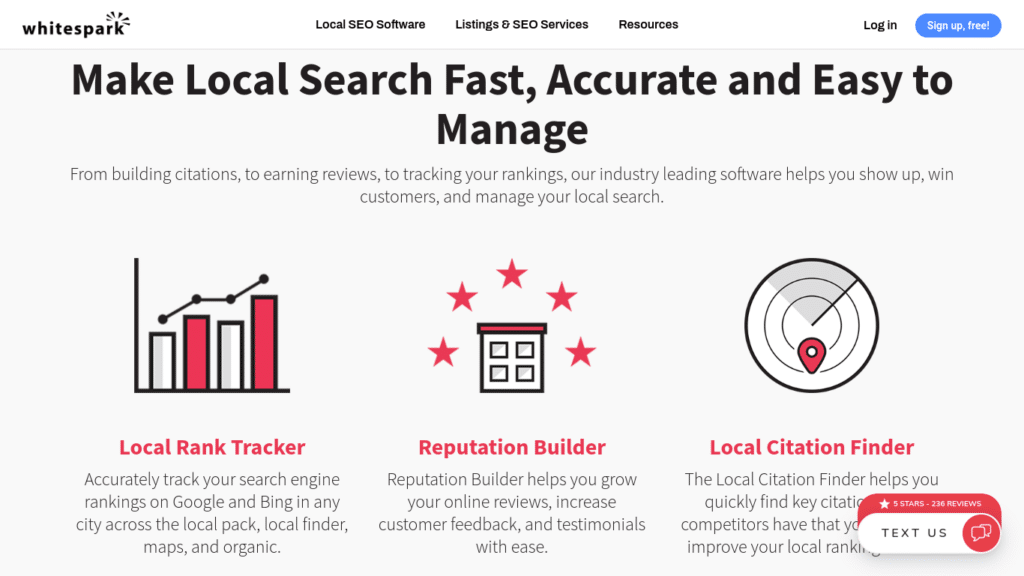
With Whitespark, you can track your progress over time to see how your SEO efforts are paying off.
This keyword-tracking tool also provides detailed information about your competitors so you can see how they rank for the same keywords.
Whitespark also offers a suite of other SEO tools, making it a one-stop shop for all your SEO needs.
Key Features:
- Tracks progress over time
- Provides competitor data
- Offers lots of SEO tools
Pricing Plans
Whitespark has 4 pricing plans. They are Small Business, Specialist, Agency, and Enterprise. All 4 plans offer unlimited domains and locations.
Small Business
- $25/month
- 100 tracked keywords
Specialist
- $50/month
- 250 tracked keywords
Agency
- $100/month
- 1,000 tracked keywords
Enterprise
- $200/month
- 2500 tracked keywords
Pros
- Free trials for almost everything they offer
- Every pricing plan offers unlimited domains and locations
- Very user-friendly interface
Cons
- Free trials offer limited features, so it can be hard to tell if its the right fit without purchasing a plan
AccuRanker
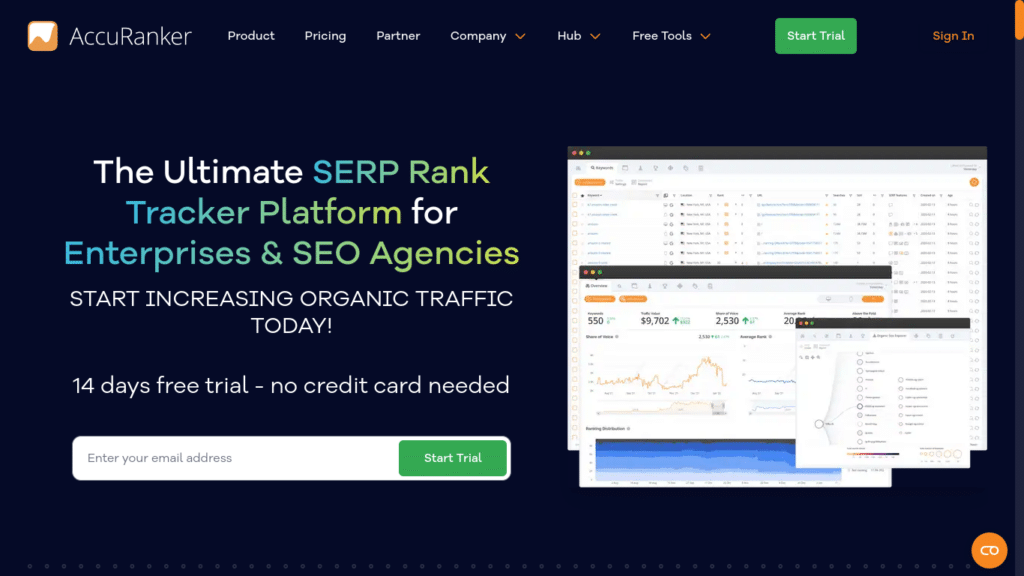
AccuRanker is a powerful, user-friendly tool that allows you to track your website’s search engine rankings in real time. With AccuRanker, you can easily see where your website ranks for any keyword and track your progress over time.
AccuRanker is the perfect tool for businesses of all sizes who are looking to improve their search engine visibility.
With AccuRanker’s fast and accurate data, you can ensure that your website is always ahead of the competition.
Key Features:
- Real-time data
- User-friendly interface
- High-volume rank tracker
- Tracks progress over time
Pricing Plans
- AccuRanker is priced by scale. You pay monthly for how many keywords you want to track. They also offer a discount of 10% off by purchasing a yearly subscription.
Pros
- 14-day free trial
- Pricing by scale allows you to customize exactly how many keywords you will track per month
- AccuRanker provides accurate tracking of keyword rankings, making it a valuable tool for SEO professionals
Cons
- The pricing structure at AccuRanker can be a little confusing, and it can be challenging to determine precisely what you need to purchase to get the most out of the tool
- The interface at AccuRanker can be a little overwhelming for beginners, and it can take some time to get used to all of the features
SERPWatcher by Mangools
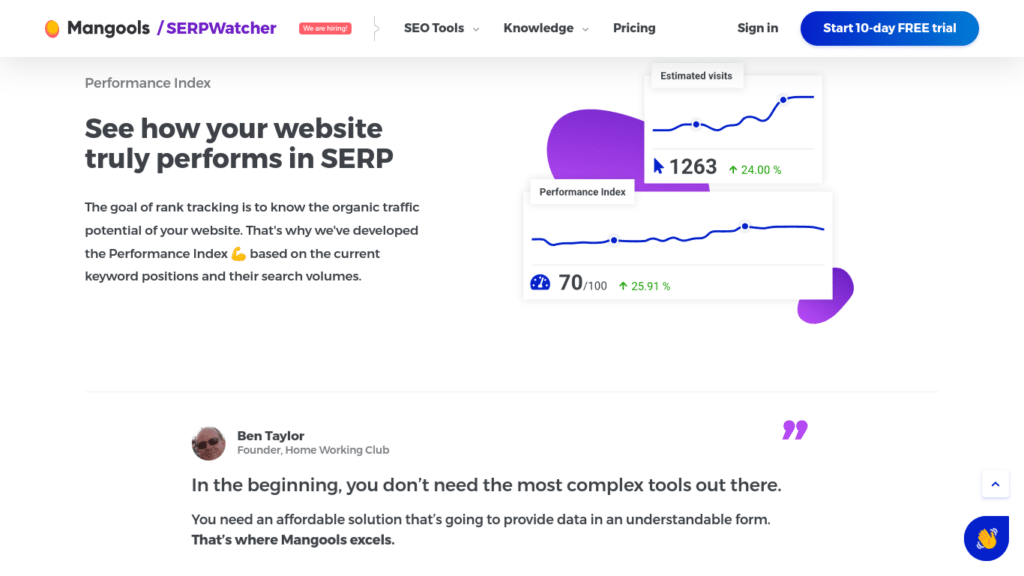
Since its inception in 2014, Mangools has become one of the most popular keyword rank tracking tools on the market. It offers a wide range of features, including SERP tracking, keyword research, and backlink analysis, all for a very reasonable price.
Mangools is an excellent option for businesses of all sizes. It’s easy to use, even for beginners and offers a wide range of features that can help you improve your SEO strategy.
Key Features:
- SERP tracking
- Keyword research
- Backlink analysis
- Mangools KWFinder
Pricing Plans
There are 3 plans for SERPWatcher by Mangools. They are the following: Basic, Premium, and Agency.
Basic Plan
- $49/month
- 200 keywords tracked daily
Premium Plan
- $69/month
- 700 keywords tracked daily
Agency
- $129/month
- 1,500 keywords tracked daily
Pros
- 48-hour money-back guarantee
- Easy-to-use SEO tools
- Lots of keyword tracking for your money
Cons
- The tool's backlink analysis feature is not as robust as some of its competitors
Keyword Hero
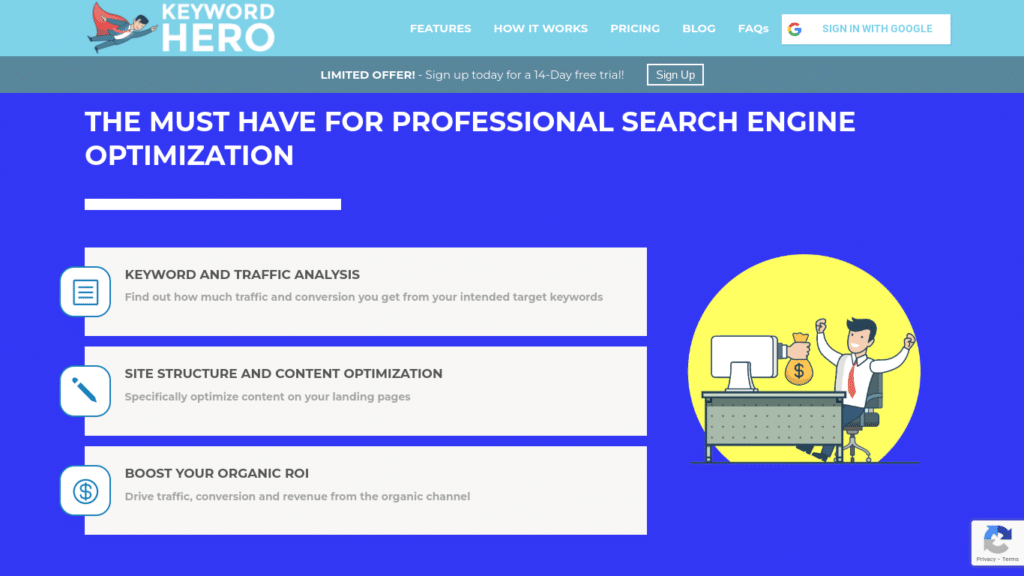
Keyword Hero is a tool that allows you to track your website’s search engine rankings for specific keywords and provides detailed information about the keywords that are driving traffic to your site.
With Keyword Hero, you can easily see which keywords drive the most traffic to your site and track your progress over time. You can also use Keyword Hero to research new keywords and find out which ones are most likely to drive traffic to your site.
Keyword Hero is a great tool for businesses of all sizes who want to improve their search engine visibility.
Key Features:
- Keyword tracking
- Detailed keyword information
- Progress tracking
Pricing Plans
There are 4 plans with Keyword Hero. They are the Little Hero, Big Hero, Giant Hero, and Ultimate Hero. All 4 plans offer a 14-day free trial and can be canceled at any time.
Little Hero
- Free
- Analyze up to 2,000 sessions
Big Hero
- $9/month
- Analyze up to 10,000 sessions
Giant Hero
- $49/month
- Analyze up to 50,000 sessions
Ultimate Hero
- $149/month
- Analyze up to 250,000 sessions
Pros
- Offers a free trial and the ability to cancel any plan at any time
- Compatible with third-party applications like Google Analytics
- Keyword Hero is very user friendly and easy to navigate.
- The data provided by Keyword Hero is accurate and up to date
- The reporting features for Keyword Hero are very comprehensive
Cons
- We received a few spam emails after signing up with Keyword Hero
Moz
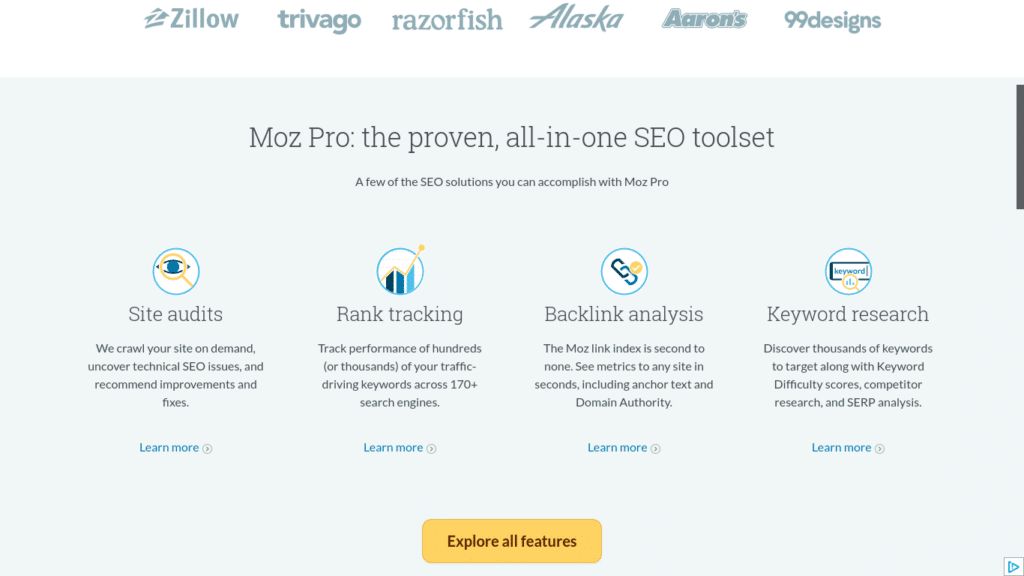
Moz has the world’s largest database of search engine keywords, making it a great tool for businesses of all sizes who want to improve their search engine visibility.
With Moz, you can easily track your progress over time and see which keywords are driving traffic to your site.
Key Features:
- Automated keyword checking
- Powerful link building tools
- Site audits
Pricing Plans
- Moz has plans starting from $99/month. They are 4 pro plans, which you can try for free. They are the Standard, Medium, Large, and Premium plans.
Standard
- $99/month
- 300 keyword rankings
- 100,000 pages crawled/week
- 1 user
Medium
- $179/month
- 1,500 keyword rankings
- 500,000 pages crawled/week
- 2 users
Large
- $299/month
- 3,000 keyword rankings
- 1,250,000 pages crawled/week
- 3 users
Premium
- $599/month
- 4,500 keyword rankings
- 2,000,000 pages crawled/week
- 5 users
Pros
- Intuitive, automated keyword tracker
- Great page crawl speed
- Moz is a well-known and popular keyword tracking tool
- Moz offers a wide variety of features and tools for users
- Moz is affordable and has a free trial available
Cons
- The website and features are a bit difficult to navigate
- Moz can be expensive, with pricing plans starting at $99/month
- The interface can be complex and difficult to navigate for beginners
- Moz's data can be unreliable at times, which can lead to inaccurate results
Wincher
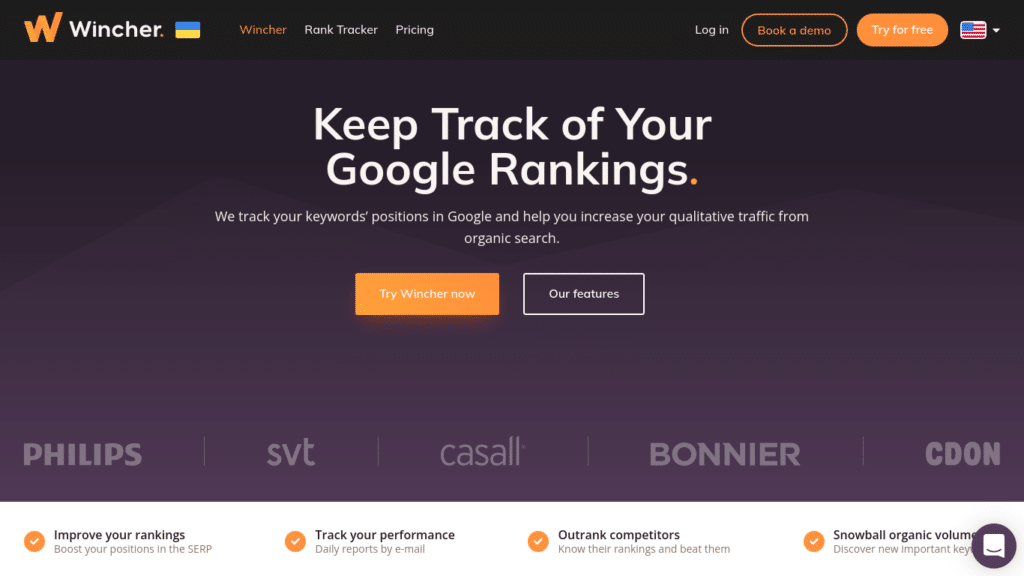
Wincher is a keyword-tracking tool that offers many features, including SERP tracking, keyword research, and competitor analysis.
With Wincher, you can easily track your progress over time and see which keywords are driving traffic to your site. You can also use Wincher to research new keywords and find out which ones are most likely to drive traffic to your site.
Key Features:
- Daily ranking updates
- Great competitor tracking
- Automated email reports
Pricing Plans
Wincher has 3 pricing plans, starting at $29/month. The plans are Starter, Business, and Enterprise.
Starter
- $29/month
- Daily ranking updates
- 10 websites
Business
- $60/month
- Daily ranking updates
- Unlimited websites
- White-labeled reports
Enterprise
- $257/month
- Daily ranking updates
- Unlimited websites
- White-labeled reports
- External users
- Project permissions
Pros
- Great competitor tracking features
- Offers a free trial, plus 2 free months with the yearly plan
- Easy-to-use interface
Cons
- We had a couple of issues when reaching out to customer service
- Can be expensive, depending on the size of your business
Advanced Web Ranking (AWR)
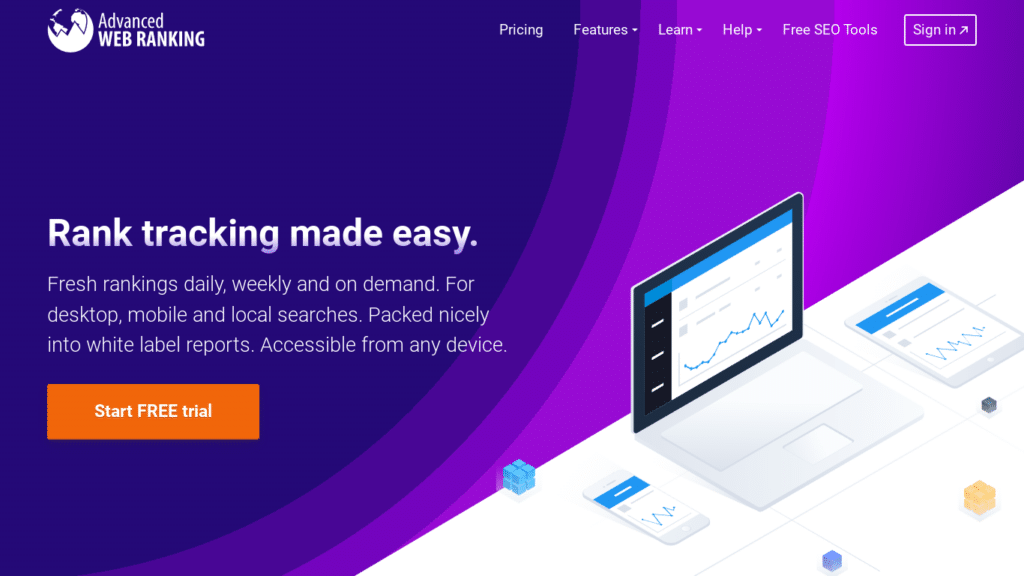
AWR is a keyword-tracking tool that offers a wide range of features, including SERP tracking, keyword research, and competitor analysis.
With AWR, you can easily track your progress over time and see which keywords drive your site traffic. You can also use AWR to research new keywords and find out which ones are most likely to drive traffic to your site.
Key Features:
- SERP tracking
- Keyword research
- Competitor analysis
Pricing Plans
- There are 4 plans with AWR, starting at $49/month. They are the Starter, Professional, Agency, and Enterprise plans.
Starter
- $49/month
- 2,000 units
Pro
- $99/month
- 7,000 units
Agency
- $199/month
- 14,500 units
Enterprise
- $499/month
- 35,500 units
Pros
- 30-day free trial with full features and a money-back guarantee
- Affordable and reliable keyword ranking
- Advanced web ranking also offers detailed reports on your website's search engine traffic, including how much traffic each keyword is generating for you
Cons
- We felt that the search volume data could be more accurate
- The price of advanced web ranking tools can be prohibitive for small businesses and individual website owners
Pro Rank Tracker
With Pro Rank Tracker, you can easily track your progress over time and see which keywords drive your site traffic. You can also use Pro Rank Tracker to research new keywords and find out which ones are most likely to drive traffic to your site.
Key Features:
- SERP tracking/ranking
- Keyword analysis and research
- Competitor analysis
Pricing Plans
- There are 3 plans with Pro Rank Tracker, plus a free trial. The plans are Starter, Pro, and Agency. All 3 are based on the number of terms tracked.
Starter
- Starts at $13.5/month
- Local & mobile tracking
- Unlimited reports
Pro
- Starts at $89/month
- Local & mobile tracking
- Unlimited reports
- 10 sub-accounts
Agency
- Starts at $180/month
- Local & mobile tracking
- Unlimited reports
- Unlimited sub-accounts
- API access
- Dedicated CSM
Pros
- Offers a free trial
- Affordable plans, priced to scale
- Accurate keyword tracking, providing real-time updates of your website's ranking on search engines
Cons
- The user interface is not as intuitive as some of the other tools on this list
- The pricing plans are a little on the expensive side, especially if you're only looking to track one or two keywords
- The support team is not always very responsive, which can be frustrating if you have questions or need help using the tool
SE Ranking

SE Ranking is a cutting-edge keyword rank tracker that offers users an in-depth understanding of their website’s performance on search engines. It provides detailed information about rankings, organic traffic, and backlinks.
SE Ranking allows users to track their progress over time and make necessary changes to improve their website’s ranking.
Key Features:
- SEO reporting tools
- Lead generator
- Keyword rank tracker
- SERP checker
Pricing Plans
- SE Ranking has 3 pricing plans, starting at $49/month. The plans are Essential, Pro, and Business.
Essential
- $49/month
- 1 user
- 10 projects
- 250 keywords
Pro
- $109/month
- 3 user
- Unlimited projects
- 1,000 keywords
Business
- $209/month
- 10 users
- Unlimited
- 2,500 keywords
Pros
- Offers a free trial
- Good value for the services they provide
- Generates leads effectively
- Customer support team was quick to respond and very helpful
Cons
- The user interface is not as intuitive as some of the other tools on this list
- We found that the tool could be a bit slow at times
What Is Keyword Tracking Software?
Keyword tracking software is a type of software that helps users track the performance of their keywords.
It does this by providing data on the number of times a keyword has been searched for, how much traffic it generates, and what the competition is like for that keyword.
This information can be used to help make decisions about which keywords to target and how best to go about targeting them.
There are a number of different keyword rank tracking tools available, and each has its own strengths and weaknesses.
It’s essential to do your research before selecting a program and to make sure that the program you choose meets your specific needs.
One thing to keep in mind when choosing a keyword rank tracker tool is that not all of them are created equal.
Some programs are better at tracking certain types of data than others, so it’s crucial to find one that suits your specific needs. Additionally, some programs are more user-friendly than others, so if you’re not particularly tech-savvy, you’ll want to choose one that is easy to use.
When it comes to choosing a keyword rank tracker, there is no one-size-fits-all solution. It’s important to do your research and find the program that best suits your individual needs.
What Are The Benefits of Search Engine Rankings Software?
There are many benefits of using search engine rankings software.
Some of these benefits include:
- Identifying keyword rankings within striking distance of the first page
- Improving your revenue by ranking higher in SERPs
- Monitoring the keywords that you’re NOT ranking for
- Tracking keyword rankings of your competitors
Identifying Keyword Rankings Within Striking Distance of the First Page
If you want to identify the keyword rankings within striking distance of the first page, you can use an advanced web ranking software program.
This type of program will allow you to see where your keywords are currently ranked and how close they are to the top of the SERPs.
This information can be used to help you make decisions about which keywords to target and how to best go about targeting them.
Improving Your Revenue By Ranking Higher in SERPs
It is no secret that improving your ranking data can lead to an increase in revenue. After all, when people are looking for a product or service, they are more likely to click on the first few results that come up in their search engine results pages (SERPs).
This means that if you can rank higher than your competitors, you are more likely to get more website traffic and, consequently, more revenue.
There are many ways to improve your search engine ranking, but using search engine ranking software is one of the most effective.
Search engine ranking software helps you track your website’s position in the SERPs and provides you with reports on how you can improve your ranking.
It also helps you identify the target keywords that your competitors are targeting and find new keywords that you can target to improve your ranking.
So if you are looking for a way to improve your revenue, consider using search engine ranking software. Not only will it help you improve your ranking, but it will also help you track your progress so that you can continue to make improvements.
Monitoring The Keywords That You’re NOT Ranking For
In addition to helping you identify the target keywords that you are ranking for, search engine rankings software can also help you monitor the keywords that you’re not ranking for.
This is important because it allows you to see where your website needs improvement. For example, if you’re not ranking for a particular keyword, you may need to tweak your website’s title or meta tags.
Additionally, if you’re not ranking for a keyword that is important to your business, you may want to consider creating content around that keyword in order to improve your ranking.
Monitoring the keywords that you’re not ranking for is an integral part of using search rankings software, and it can help you make the necessary improvements to your website so that you can rank higher in the future.
Tracking Keyword Rankings Of Your Competitors
There are many benefits of using search engine ranking software to track the keyword rankings of your competitors.
Perhaps the most obvious benefit is that you can gain valuable insights into what strategies your competitors are using to rank their websites.
This information can help you to improve your own website’s SEO strategy and improve your chances of ranking higher in search engines.
Another benefit of tracking your competitors’ keyword rankings is that you can identify new opportunities for keywords that your competitors are targeting, but you are not. This can help you to expand your own website’s keyword list and potentially get ahead of your competition.
Finally, using search engine ranking software to track your competitors’ rankings can help you to stay ahead of the curve when it comes to SEO changes and updates.
By knowing what changes your competitors are making, you can make changes to your own website accordingly and stay one step ahead.
How Do You Choose The Best Rank Tracking Software?
There are many rank tracking software options on the market, but how do you choose the best one for your business?
Here are a few tips to help you make the best decision for your needs:
- Consider the price
- Decide what you need the rank tracking software for
- Compare the features of different rank tracking software
- Choose the rank tracking software that best suits your needs
Consider The Price
When you’re looking for rank tracking software, price is obviously an important factor to consider. You want to find something that’s affordable without sacrificing quality.
There are a few things you can do to make sure you’re getting the best deal. First, compare prices between different providers. Second, look for discounts or deals that might be available. And finally, see if there’s a free trial available so you can test it out before buying.
By taking these steps, you can be sure to find the suitable rank tracking software for your needs and your budget.
Decide What You Need The Rank Tracking Software For
When choosing the best rank tracking software, you must determine what you need it for.
Do you need to track your website’s ranking for a particular keyword or phrase? Are you looking for a tool that will monitor your website’s ranking daily, weekly, or monthly?
There are a number of different factors to consider when choosing the best rank tracking software for your needs. Some of the most important factors include the price of the software, the features offered, and the level of customer support available.
When making your decision, be sure to ask yourself the following questions:
- What do I need the rank tracking software for?
- How often do I need to track my website’s ranking?
- What are my budget restrictions?
- What features does the software offer?
- How much customer support is available?
Compare The Features of Different Rank Tracking Software
When it comes to choosing the best rank tracking software for your business, it is important to compare the features of different options to find the one that fits your needs.
Some software offers comprehensive tracking of all your website’s rankings, while others offer more limited tracking or only track a certain number of keywords. Additionally, some software provides excellent reporting and analysis features, while others are more basic.
Before you make a decision, be sure to consider how important each of these factors is to you and your business. If comprehensive tracking and detailed reporting are essential, then you may want to opt for software that offers those features.
However, if you only need to track a few keywords or don’t need detailed reporting, then a less comprehensive option may be better for you. By considering your needs and wants, you can find the best rank tracking software for your business.
Executive Conclusion
There are a lot of great rank tracking software options on the market, but how do you choose the best one for your needs?
Consider the price, decide what you need the software for, compare the features of different options, and choose the one that best suits your needs.
Ultimately, we found that Semrush and Ahrefs were our preferred keyword rank tracking tools.
What did you end up going with? Let us know in the comments below!
FAQs about topic
There are a number of ways to track your website’s keywords. One way is to use a tool like Google Analytics. Google Analytics can show you which keywords your website is being found for on Google search. It can also show you how much traffic those keywords are bringing to your website.
Another way to track your website’s keywords is to use a tool like Semrush. Semrush can show you which keywords your website is ranking for on Google search, as well as how much traffic those keywords are bringing in. It can also show you the competition for each of those keywords.
If you’re looking for a more detailed analysis of your website’s keyword rankings, you may want to use a tool like Ahrefs. Ahrefs can show you not only which keywords your website is ranking for but also how much traffic those keywords are bringing in and the competition for each of those keywords.
It can also show you which pages on your website are ranking for each keyword and how much organic traffic each page is receiving.
There are many benefits of using a keyword tracker. Some of the most important benefits include the following:
You can track your competition’s keywords. This is important because it allows you to see what keywords they are targeting and how they are ranking. This information can help you determine which keywords to target yourself.
You can track your own keywords. This is important because it allows you to see how your website is performing with respect to specific keywords. If you see that your website is not ranking well for a particular keyword, you can work on improving your ranking.
You can track your website’s rankings for specific keywords. This is important because it allows you to see how well your website is ranking for different keywords. If you see that your website is not ranking well for a particular keyword, you can work on improving your ranking.
You can track your website’s click-through rate (CTR). This is important because it allows you to see how well your website is performing with respect to specific keywords. If you see that your CTR is low, you can work on improving it.
You can track your website’s organic search traffic. This is important because it allows you to see how much traffic your website is getting from organic searches, such as with Google search results. If you see that your website’s organic search traffic is low, you can work on increasing it.
There is no definitive answer to this question. Some factors to consider include how often your competitors are updating their keywords, how often you are making changes to your website or content, and how much traffic you are hoping to get from your target keywords.
Generally speaking, you will want to track your keywords at least once a month to ensure that you are keeping up with your competition and that your website is still appearing in search engine results pages (SERPs) for the terms you are targeting.
However, if you are making significant changes to your website or content, you may need to track them more often. Likewise, if you are seeing a lot of movement in your competitor’s keyword rankings, you’ll want to keep an eye on them more frequently.
The line between keyword trackers and search engine optimization (SEO) tools is increasingly blurry. They both help you keep tabs on your target keywords, but their purposes diverge beyond that.
Keyword trackers help you determine which keywords are worth targeting for your website and how well you’re doing at ranking for them. SEO tools, on the other hand, help you improve your website’s ranking on search engines by giving you feedback on your website’s structure, content, and optimization.
In general, then, keyword trackers can be seen as a preliminary step to SEO, while SEO tools are more concerned with taking actionable steps to improve your website’s ranking. However, there are some great SEO tools that also include features for tracking keywords, so it’s important to consider your specific needs when choosing a tool.
A keyword tracking tool collects data from various sources, including search engines, to help users track their keywords.
The data collected includes information on how many people are searching for a particular keyword, how many websites are ranking for that keyword, and how much competition exists for that keyword.
This information is then presented in an easy-to-read report, so users can track the progress of their keywords and make necessary adjustments.
Many different keyword rank tracking tools are available, and it can be challenging to determine which is the best for your needs. Some of the most popular keyword research tools include Semrush and Ahrefs.
Each tool has its own strengths and weaknesses, so you must decide which fits your business’s needs best. For example, if you are looking for a tool that can help you track your competitor’s keywords, then Ahrefs would be a good option. If you are looking for a tool that can help you with SEO analysis, then SEMrush would be a better choice.
Doing your research before choosing a keyword tracking tool is important, as each tool offers different features and pricing plans. You want to ensure that the selected tool fits your needs and budget.
There are three main types of keyword tracking tools:
Free tools – These are usually limited in features but can be useful for basic monitoring purposes.
Paid tools – These offer a wider range of features and are more comprehensive in their tracking capabilities.
Enterprise level tools – These are designed for larger businesses with more complex needs and offer the most comprehensive set of features.
When it comes to keyword tracking, less is more. That might sound counterintuitive, but when it comes to SEO, the key is focusing on tracking the right keywords – not just any and all keywords related to your business. It’s better to focus on high-value phrases that visitors are likely to use when looking for products or services like yours. That means selectivity and quality are more important than quantity when it comes to keyword tracking.
Think of it this way: how many words would you use to describe your product or service? Choosing the right keywords can be a tricky task, but once you’ve identified them, you’ll have a better sense of which phrases are more likely to get your business noticed.
When it comes to SEO, some techniques should definitely be avoided. One of the biggest “no-nos” is keyword stuffing – or filling your content with too many keywords in order to boost its rankings. This practice can result in a penalty from search engines, as it’s seen as an attempt to manipulate the algorithm and deceive visitors.
Another tactic to avoid is buying links from other websites. This type of link acquisition goes against most search engine algorithms, and can get you penalized if it’s discovered that your website is engaged in this practice. Additionally, automated submission of content to directories or blog networks can also land you in hot water with search engines. The takeaway here is to focus on white-hat SEO techniques, such as quality content and link building, rather than trying to game the system.

